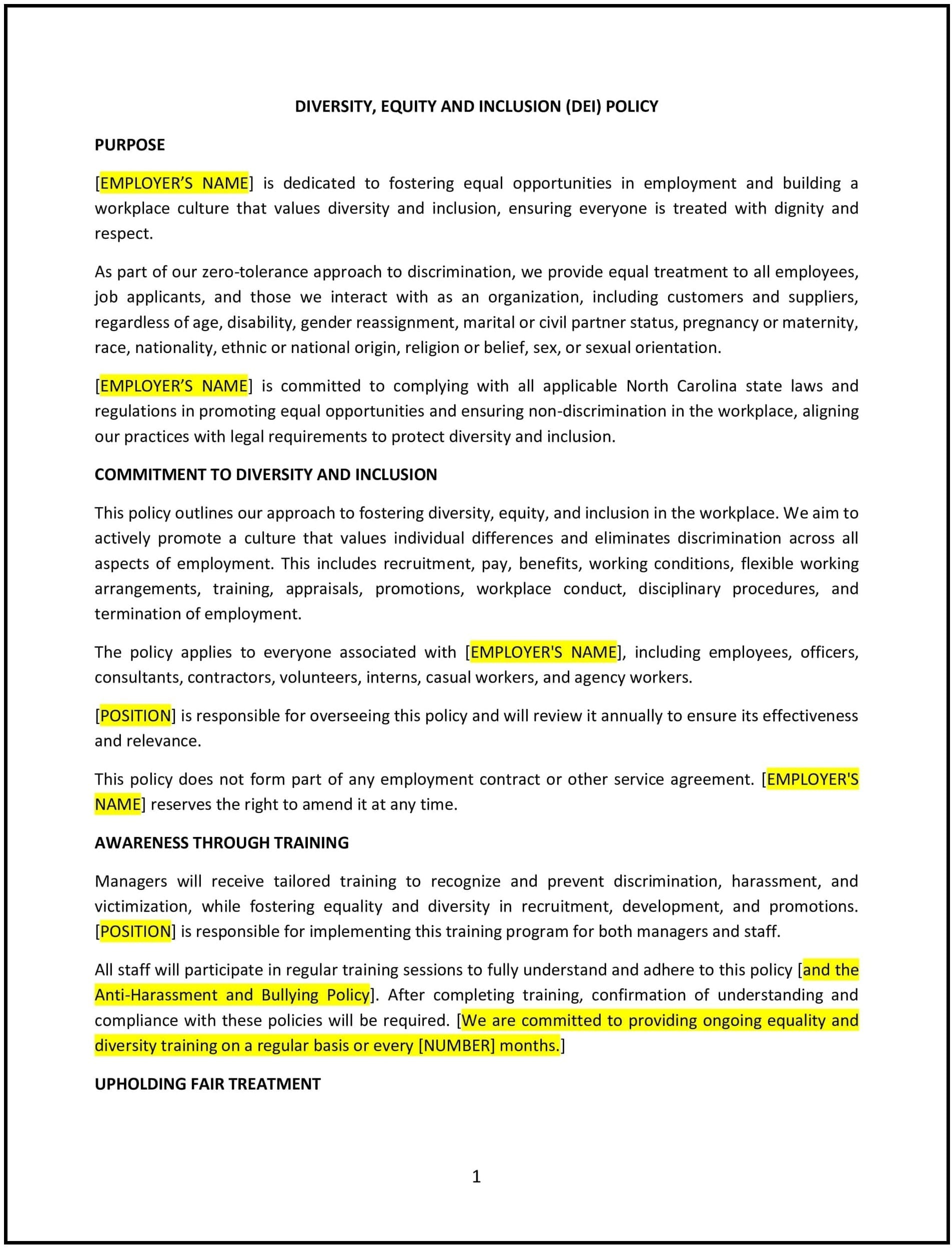Diversity, equity and inclusion (DEI) policy (North Carolina): Free template
Got contracts to review? While you're here for policies, let Cobrief make contract review effortless—start your free review now.

Customize this template for free
Diversity, equity and inclusion (DEI) policy (North Carolina)
A diversity, equity, and inclusion (DEI) policy helps North Carolina businesses promote a workplace culture where all employees feel valued, respected, and have equal opportunities for success, regardless of their race, gender, religion, disability, or other characteristics. This policy emphasizes the company’s commitment to building a diverse workforce, fostering equitable treatment, and creating an inclusive environment that supports everyone.
By adopting this policy, businesses can ensure that their work environment promotes fairness, reduces discrimination, and enhances employee engagement and retention, all while reflecting the values of North Carolina’s workforce.
How to use this diversity, equity and inclusion (DEI) policy (North Carolina)
- Define diversity, equity, and inclusion: Clearly define what diversity, equity, and inclusion mean within the context of your company’s culture. Address the specific elements you aim to foster, such as cultural diversity, gender equality, and fair treatment.
- Establish hiring practices: Implement hiring practices that ensure all candidates, regardless of background, have equal opportunities to apply and succeed. Include measures to address unconscious bias in hiring decisions.
- Promote inclusive behaviors: Encourage employees to engage in respectful and inclusive behavior, ensuring that all individuals are treated with dignity and fairness. This includes training programs on diversity and inclusion for all employees.
- Provide equitable opportunities: Ensure all employees have access to equal opportunities for training, advancement, and professional development, regardless of their identity or background.
- Ensure a supportive environment: Create a supportive environment where employees feel safe reporting concerns related to discrimination, bias, or exclusion, with clear procedures in place for addressing complaints.
- Reflect North Carolina-specific considerations: Tailor the policy to comply with North Carolina’s specific anti-discrimination laws and other relevant state regulations. Incorporate any local initiatives or community programs that align with DEI goals.
Benefits of using this diversity, equity and inclusion (DEI) policy (North Carolina)
This policy provides several benefits for North Carolina businesses:
- Fosters a positive workplace culture: A diverse, equitable, and inclusive environment improves employee morale and engagement, as employees are more likely to feel valued and respected.
- Enhances employee retention: DEI policies help businesses retain employees by fostering an environment of fairness and opportunity, making employees feel supported and included.
- Attracts diverse talent: Companies that prioritize diversity and inclusion are more attractive to a wide pool of talent, including candidates from underrepresented groups.
- Improves company reputation: A strong DEI commitment builds the company’s reputation as a socially responsible and progressive employer, attracting customers and clients who value these principles.
- Increases innovation and creativity: A diverse workforce brings varied perspectives, which can lead to more creative solutions, better problem-solving, and a broader range of ideas.
- Complies with legal requirements: This policy ensures that the business complies with North Carolina’s anti-discrimination laws, as well as federal regulations like Title VII of the Civil Rights Act.
Tips for using this diversity, equity and inclusion (DEI) policy (North Carolina)
- Communicate the policy clearly: Ensure that the policy is accessible to all employees and clearly outlines the company’s commitment to diversity, equity, and inclusion. Include it in the employee handbook and mention it during onboarding.
- Provide ongoing training: Offer continuous training on DEI topics, including unconscious bias, cultural competency, and how to handle discrimination and harassment in the workplace.
- Encourage employee participation: Create opportunities for employees to engage in DEI initiatives, such as employee resource groups, mentorship programs, or community outreach activities.
- Review the policy regularly: The policy should be reviewed annually to ensure it is aligned with North Carolina’s laws, any changes in workplace practices, and the company’s evolving DEI goals.
- Measure progress: Track the success of DEI initiatives by monitoring diversity in recruitment, promotions, and retention. Regularly assess whether the policy is having the desired impact.